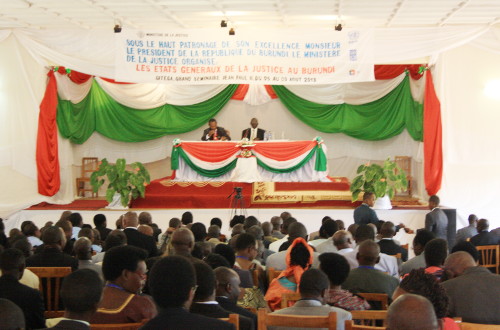In 2013, participants at a major summit to improve justice in Burundi drew up a list of activities to improve justice – but there have been few achievements since. A local peacebuilding organization, Parcem, says much needs to be done for the justice system in Burundi to achieve independence.

Participants in the general assembly of justice held in Gitega in August 2013 had had decided to improve the image of justice in Burundi
5 August 2013 was a historical date for justice to change its course in Burundi, said the chairman of the local organization-Parcem, Faustin Ndikumana this 4 August. On that day, the government, justice officials and civil society met in Gitega Province and for five days discussed how to improve justice in Burundi. The event was critical to the future stability of Burundi: “There is no peace without justice”, Ndikumana said. But four years later he is concerned that there has been no improvement in the sector.
Ndikumana said that the justice sector faces many challenges. There is currently no trust between official institutions in Burundi, for example between the judiciary and the police. Impunity, unfair imprisonment and corruption also constrain the independence of the justice system, he said.
During the five-day justice summit that was held in August 2013, the 300 participants recommended that the government set up a high-level council of judges, reform the organization and composition of the judiciary, and produce a report on all of this after the summit. During the press conference organized this 4 August, Faustin Ndikumana said that nothing has been done. “We also recommended that the ministry of justice carry out inspections of the judiciary. If we want an independent judiciary, we need to strengthen these inspections”, he said.
Aimée Laurentine Kanyana, the Minister of Justice, said that the report has been written but that the recommendations will be carried out step-by-step because the ministry must have enough money for them. “We have already implemented some reforms in the organization and composition of judges. The establishment of the superior council of judges is in progress”, she said. The Minister, speaking to Iwacu, also said that certain activities, such as the implementation of local justice mechanisms, require a high level of funding. “We need to focus more on the local judiciary. We have already set up a center in charge of sensitizing people but it lacks funds to operate”, she says. The budget allocated to the ministry of justice in 2017 amounted to BIF 18 billion.
Before the current crisis that began in April 2015, roughly half of Burundi’s budget was funded by international donors. In the 2016-17 budget that figure dropped to below 30% due to cuts to international aid. The EU, whose aid accounted for 20% of the budget, decided to freeze direct aid in March 2016.



















 IWACU Open Data
IWACU Open Data

